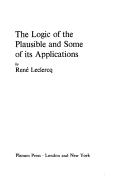| Listing 1 - 4 of 4 |
Sort by
|
Book
ISBN: 9783631564738 Year: 2008 Publisher: Frankfurt am Main Lang
Abstract | Keywords | Export | Availability | Bookmark
 Loading...
Loading...Choose an application
- Reference Manager
- EndNote
- RefWorks (Direct export to RefWorks)
Immortality --- Plausibility (Logic) --- Religion and sociology --- History of doctrines --- Social aspects --- History
Book
ISBN: 2705665706 9782705665708 Year: 2006 Publisher: Paris: Hermann,
Abstract | Keywords | Export | Availability | Bookmark
 Loading...
Loading...Choose an application
- Reference Manager
- EndNote
- RefWorks (Direct export to RefWorks)
Malgré de constants progrès techniques et scientifiques, nos sociétés restent des sociétés de croyances. Les rumeurs, les idéologies, les superstitions restent intimement ancrées dans notre vie quotidienne, alors même que la diffusion des connaissances scientifiques gagne chaque jour en importance. Comment résoudre ce paradoxe : nous accordons de plus en plus notre confiance à la science, tout en laissant aisément se développer des croyances parfois irrationnelles ? Cet essai se propose d'examiner ce paradoxe, propre à nos sociétés modernes, en mobilisant des exemples aussi divers que le mythe du Père Noël, les légendes du 11 septembre 2001, une psychose collective qui gagna la ville de Seattle dans les années 50, le processus d'adhésion à une secte... Quoique sensiblement hétéroclites, toutes ces illustrations peuvent être ramenées à la question de l'émergence et de la disparition des croyances collectives. Quels processus mènent à leur avènement ou à leur abandon ? Gérald Bronner nous fournit une première approche de ces questions épineuses sur la base d'expérimentations inédites en sciences sociales.
Social psychology --- Opinion (Philosophy) --- Plausibility (Logic) --- Superstition --- Psychologie sociale --- Opinion (Philosophie) --- Vraisemblance --- Superstitions --- Belief and doubt --- Group identity --- Social Psychology --- Collective Beliefs

ISBN: 0306307936 1468407449 1468407422 Year: 1974 Publisher: London Plenum Press
Abstract | Keywords | Export | Availability | Bookmark
 Loading...
Loading...Choose an application
- Reference Manager
- EndNote
- RefWorks (Direct export to RefWorks)
Plausibility (Logic) --- Probabilities. --- Thought and thinking --- Vraisemblance --- Probabilités --- Pensée --- History. --- Histoire --- Probabilities --- -Mind --- Thinking --- Thoughts --- Educational psychology --- Philosophy --- Psychology --- Intellect --- Logic --- Perception --- Psycholinguistics --- Self --- Probability --- Statistical inference --- Combinations --- Mathematics --- Chance --- Least squares --- Mathematical statistics --- Risk --- Plausible (Logic) --- History --- -History --- Plausibility (Logic). --- Probabilités --- Pensée
Book
ISBN: 9780521762946 0521762944 Year: 2012 Volume: *95 Publisher: Cambridge: Cambridge university press,
Abstract | Keywords | Export | Availability | Bookmark
 Loading...
Loading...Choose an application
- Reference Manager
- EndNote
- RefWorks (Direct export to RefWorks)
"The Greek word eoikos can be translated in various ways. It can be used to describe similarity, plausibility or even suitability. This book explores the philosophical exploitation of its multiple meanings by three philosophers, Xenophanes, Parmenides and Plato. It offers new interpretations of the way that each employs the term to describe the status of their philosophy, tracing the development of this philosophical use of eoikos from the fallibilism of Xenophanes through the deceptive cosmology of Parmenides to Plato's Timaeus. The central premise of the book is that, in reflecting on the eoikos status of their accounts, Xenophanes, Parmenides and Plato are manipulating the contexts and connotations of the term as it has been used by their predecessors. By focusing on this continuity in the development of the philosophical use of eoikos, the book serves to enhance our understanding of the epistemology and methodology of Xenophanes, Parmenides and Plato's Timaeus"--
Pre-Socratic philosophers. --- Plausibility (Logic) --- Resemblance (Philosophy) --- Présocratiques --- Vraisemblance --- Ressemblance (Philosophie) --- Xenophanes, --- Parmenides --- Plato. --- Plato --- Présocratiques --- Similarity --- Knowledge, Theory of --- Identity (Philosophical concept) --- Parmenides. --- Senofane, --- Xénophane, --- Ξενοφάνης, --- Xenophanēs, --- Aflāṭūn --- Aplaton --- Bolatu --- Platon, --- Platonas --- Platone --- Po-la-tʻu --- Pʻŭllatʻo --- Pʻŭllatʻon --- Pʻuratʻon --- Πλάτων --- אפלטון --- פלאטא --- פלאטאן --- פלאטו --- أفلاطون --- 柏拉圖 --- 플라톤 --- Platon --- Platoon --- Ksenofanes, --- Платон --- プラトン --- Xenophanes, - ca. 570-ca. 478 B.C.
| Listing 1 - 4 of 4 |
Sort by
|

 Search
Search Feedback
Feedback About UniCat
About UniCat  Help
Help News
News